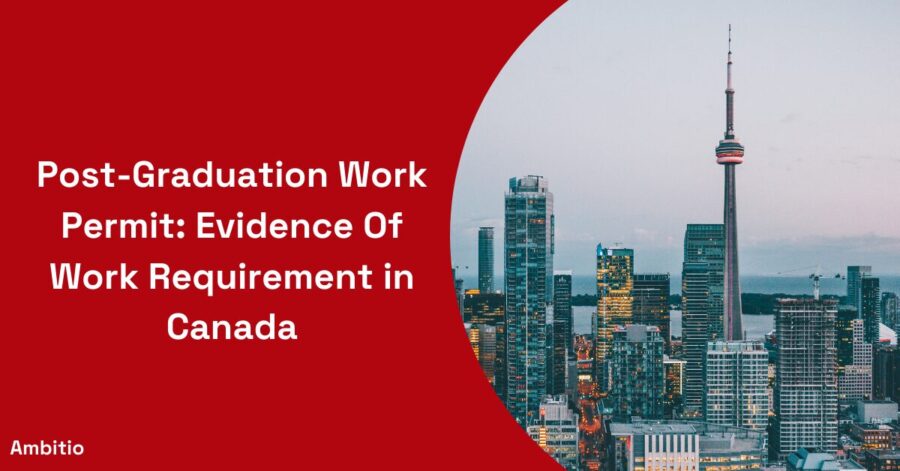11 December 2024
5 minutes read
Post-Graduation Work Permit: Evidence Of Work Requirement in Canada

Key Takeaways
Are you planning to stay and work in Canada after graduation? Navigating the Post-Graduation Work Permit (PGWP) process can be challenging, especially when it comes to providing the right evidence of work. Many international graduates find themselves confused and stressed about meeting these requirements.
Understanding the documentation needed for the PGWP is crucial but often overwhelming. This blog will guide you through the essentials, ensuring you are well-prepared to secure your work permit and kickstart your career in Canada. Read on to simplify the process and avoid common pitfalls.
Co-Operation Work Permits and Proof of Employment in Study Visa to Study in Canada
When planning to study in Canada, many programs include co-op or internship components that require a separate co-op work permit. This permit allows you to gain valuable work experience while you study, bridging the gap between academic knowledge and practical application.
Co-op work permits are essential because they enable you to work in Canada legally while studying. This experience can be crucial for your career, providing you with skills and connections in your field.
Having proof of employment when you apply for a study permit demonstrates to Immigration, Refugees, and Citizenship Canada (IRCC) that you are committed to gaining professional experience in addition to your studies. This can strengthen your visa study permit application.
Co-op work permits help you meet the requirements for a Post-Graduation Work Permit later on. By showing that you have gained Canadian work experience during your studies, you are better positioned to continue working in Canada after graduation.
Who Needs to Provide Evidence of Work?
When applying for a Post-Graduation Work Permit, understanding who needs to provide evidence of work is crucial. This requirement ensures that only eligible students, who have gained valid work experience during their studies, can transition to working in Canada post-graduation.
Students with a valid study permit who have completed a study program at a designated learning institution often need to submit proof of their work placements. This includes co-op placements or internships that were part of their program of study. Immigration, Refugees, and Citizenship Canada (IRCC) requires this evidence to verify that the work experience aligns with the requirements of your acceptance letter and study program.
Providing evidence of work is necessary for students whose study programs mandated practical experience. This helps IRCC confirm that your work placements were an integral part of your academic curriculum. By understanding these requirements and preparing the necessary documentation, you can streamline your application process and enhance your chances of obtaining a Post-Graduation Work Permit.
Types of Required Evidence
When applying for a Post-Graduation Work Permit, knowing the types of required evidence is essential. This documentation proves that you have completed the necessary work experience as part of your educational program.
You will need to provide a letter of acceptance from your educational institution that outlines your study program and any mandatory work placements. This helps Canadian immigration verify that your work off campus was an official requirement of your studies. Additionally, you may need to submit pay stubs, letters from employers, or other official documents that confirm your employment and the nature of your work.
Including detailed records of your work placements, such as job descriptions and performance evaluations, can strengthen your visa application. These documents demonstrate that your work experience was directly related to your field of study and completed under the guidelines set by your educational institution. By providing comprehensive evidence, you can enhance your chances of securing a Post-Graduation Work Permit and continuing your career in Canada.
Securing a Post-Graduation Work Permit requires providing proper evidence of your work experience. Here’s a detailed guide to help you through the process.
Step 1: Contact Your College
Start by reaching out to your college or university to obtain official documentation of your work placements. This includes a letter confirming that your program allowed you to work up to 20 hours per week and that these work placements were part of your academic requirements. For students outside Canada, ensure that your temporary resident visa indicates you were eligible to work during your studies.
Step 2: Collect Employment Records
Next, gather all records related to your employment during your study period. This includes pay stubs, contracts, and letters from your employers that detail your job duties and the duration of your employment. If you worked within Canada under an open work permit, make sure these documents are clear and detailed for your visa application at the visa application center.
Step 3: Include Supporting Documents
Supporting documents are crucial to your application. Include job descriptions, performance reviews, and any other paperwork that confirms you were allowed to work and the nature of your work experience. This comprehensive documentation will support your case when you submit your application to the government of Canada, ensuring they understand your work was integral to your studies.
Step 4: Prepare Your Study Permit Application
Prepare your study permit application meticulously. Ensure that it shows you were a full-time student and that your Canadian student visa or Canadian study permit was valid during your work placements. If your program required work experience, mention that you needed a co-op work permit and highlight that you have already applied for your study permit and work permit application.
Step 5: Submit Your Application
Once all documents are ready, submit your application to the appropriate educational institution in Canada. Confirm that you are eligible for a co-op work permit and include all evidence of your work placements. Ensure everything is correctly filled out to avoid delays, and remember, leaving Canada might affect your hours of work eligibility.
Step 6: Follow Up
After submitting your application, follow up regularly to check its status. Ensure you meet all requirements for Canada and respond promptly to any requests for additional information. Staying proactive will help you avoid any issues and ensure a smooth process in obtaining your Post-Graduation Work Permit.
Maximizing Work Opportunities for International Students in Canada
Maximizing work opportunities for international students in Canada involves leveraging every aspect of your course in Canada. Enroll in programs that include co-op placements or internships, as these offer hands-on experience and enhance employability. Utilize your study permit’s provisions to work part-time during the academic year and full-time during breaks, gaining valuable Canadian work experience. Network through campus events, career fairs, and industry meetups to connect with potential employers. By strategically planning your course in Canada and actively seeking work opportunities, you can build a strong foundation for your future career in the country.
Conclusion
Navigating the Post-Graduation Work Permit process and providing the necessary evidence of work can seem daunting, but with the right preparation and understanding, it becomes manageable. By knowing who needs to provide evidence, the types of required documentation, and the steps to obtain it, you can confidently work towards securing your future in Canada.
Maximizing work opportunities during your course in Canada not only enhances your academic experience but also sets you up for long-term success. Stay proactive, gather your documentation early, and ensure your application is thorough to make the most of your Canadian education and work experience. With these insights, you’re well-equipped to embark on a rewarding career journey in Canada.

You can study at top universities worldwide!
Get expert tips and tricks to get into top universities with a free expert session.
Book Your Free 30-Minute Session Now! Book a call now




























